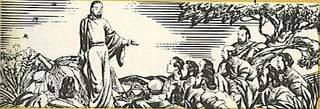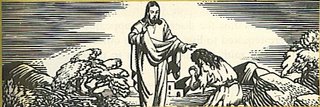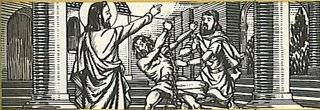The Sermon on the Mount, The Beatitudes

Chapter 23
MATT. 5:l-l6; LUKE 6:20-26
SITTING DOWN IN THE MIDST OF THE MULTITUDE on the mountainside, Jesus began the discourse which we call the Sermon on the Mount. First He enumerated the virtues which must be pursued by the members of His kingdom; then He told them that they must extend their own holiness to all mankind. Speaking primarily to His disciples, but also to the crowd, He said:
"Blessed are the poor in spirit, for theirs is the kingdom of heaven. Blessed are the meek, for they shall possess the earth. Blessed are they who mourn, for they shall be comforted. Blessed are they who hunger and thirst for justice, for they shall be satisfied. Blessed are the merciful, for they shall obtain mercy. Blessed are the pure of heart, for they shall see God. Blessed are the peacemakers, for they shall be called the children of God. Blessed are they who suffer persecution for justice' sake, for theirs is the kingdom of heaven.
"Blessed are you when men reproach you, and persecute you, and, speaking falsely, say all manner of evil against you,
for My sake. Rejoice and exult, because your reward is great
in heaven; for so did they persecute the prophets who were
before you. But woe to you rich! for you are now having your
comfort. Woe to you who are filled! for you shall hunger. Woe;
to you who laugh now! for you shall mourn and weep. Woe to
you when all men speak well of you! In the selfsame manner
their fathers used to treat the prophets."
Referring especially to His apostles, He continued:
"You are the salt of the earth; but if the salt loses its strength, what shall it be salted with? It is no longer of any use but to be thrown out and trodden under foot by men.
"You are the light of the world. A city set on a mountain cannot be hidden. Neither do men light a lamp and put it under the measure, but upon the lamp-stand, so as to give light to all the house. Even so let your light shine before men, in order that they may see your good works and give glory to your Father in heaven."

The first beatitude concerns poverty. The attitude we take towards money and the things it will buy is a good index to the depth of our faith. If we are unhappy because we do not have all the wealth enjoyed by a neighbor, if we think often of adding to our material possessions, if we are always eager to increase our fortune (even if we would do nothing dishonest), we have deserted the ideal presented in the first beatitude. Christian poverty is a liberation from the enslaving desire for temporal riches. Only the man who is poor, at least in spirit, can give his heart to God.
















